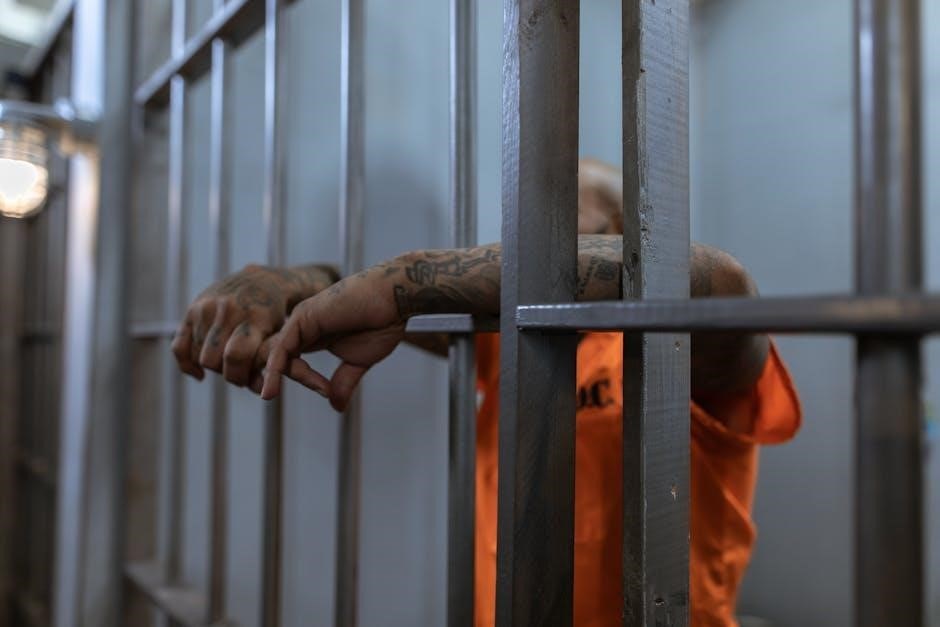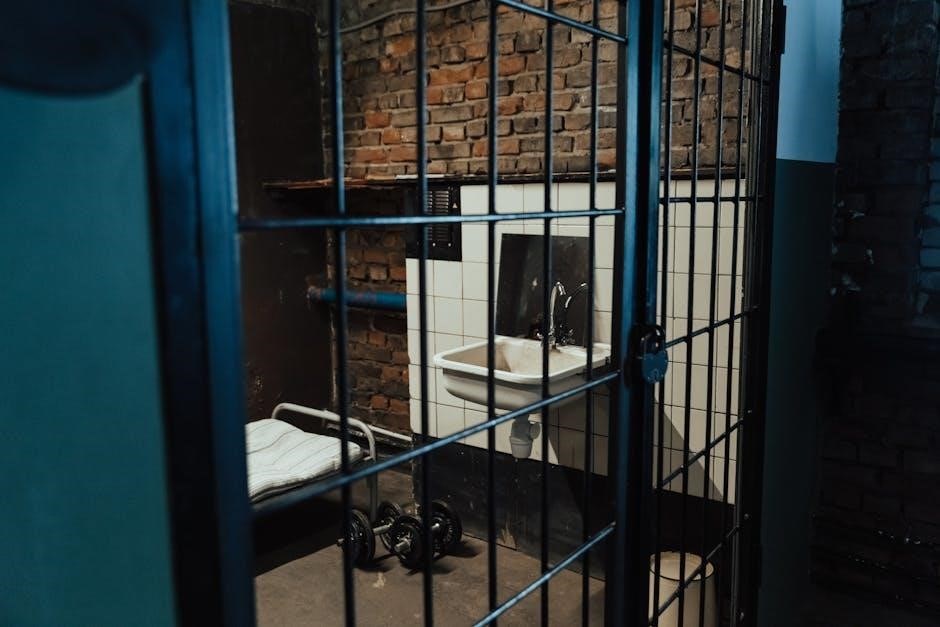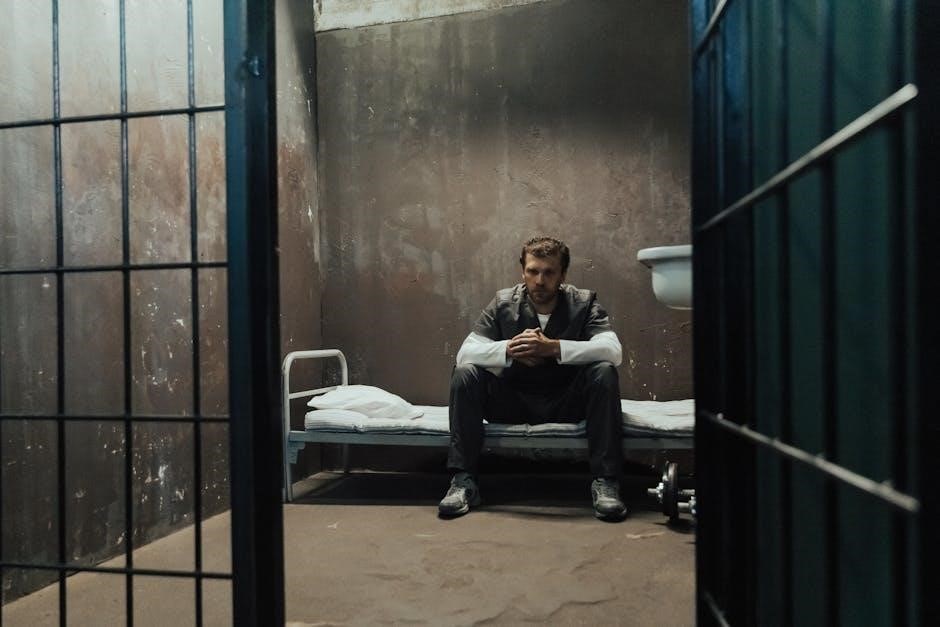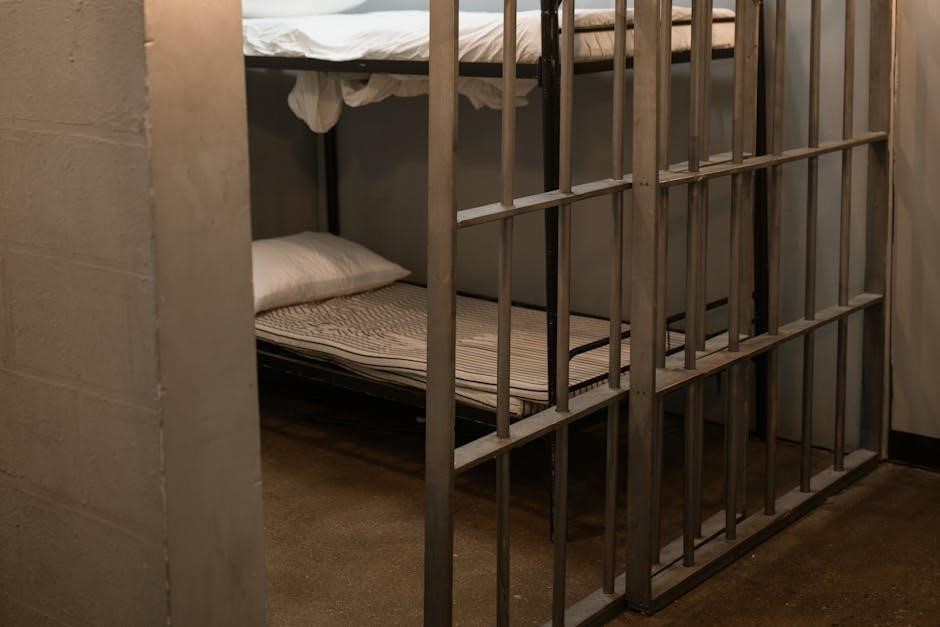
irving jail pdf
The Irving Police Department’s Jail In Custody Report provides a detailed list of adult inmates, including names, charges, booking dates, and court appearances, available as a PDF for public transparency.

Current Inmates at Irving Jail
The Irving Jail currently holds inmates like Corey Todd Henson and Laura Alejandra Lopez, facing charges such as assault and driving offenses, as detailed in the custody report.
Names and Charges
Current inmates at Irving Jail include Corey Todd Henson, charged with assault and escape, and Laura Alejandra Lopez, facing driving-related offenses. Additional names like Robert A. Alvarez Hernandez are listed with specific charges, providing transparency into the jail’s population and legal proceedings.
- Corey Todd Henson: Assault and escape charges.
- Laura Alejandra Lopez: Driving while intoxicated and related offenses.
- Robert A. Alvarez Hernandez: Charges detailed in the custody report.
These details highlight the variety of cases handled by the Irving Jail, ensuring public access to inmate information.
Booking Details
The Irving Jail’s booking details reveal specific information about each inmate’s intake process. For instance, Corey Todd Henson was booked on September 24, 2025, under Booking No. 25-0236402 for assault and escape charges. Similarly, Laura Alejandra Lopez was booked on October 5, 2025, with Booking No. 25-0238599 for driving-related offenses. These records include the exact dates and charges, providing a clear overview of recent intakes.
- Booking No. 25-0236402: September 24, 2025, for assault and escape charges.
- Booking No. 25-0238599: October 5, 2025, for driving-related offenses.
Such details ensure accountability and transparency in the booking process at Irving Jail.
Recent Bookings and Arrests
Irving Jail has processed over 50 bookings in the past 48 hours, with charges ranging from misdemeanor offenses to more serious felony allegations.
Past 24 Hours Bookings
Within the last 24 hours, Irving Jail has recorded 32 new bookings, primarily for misdemeanor offenses such as theft, driving under the influence, and disorderly conduct. Felony charges included drug possession and burglary. Several bookings involved domestic violence incidents, highlighting ongoing challenges in the community. The majority of individuals were apprehended during routine traffic stops or as part of active warrants. Authorities noted a spike in bookings during late-night hours, correlating with increased patrol activities. The jail processed an average of 1.3 bookings per hour, with the highest volume occurring between 10 PM and 2 AM. Most defendants are awaiting arraignment, with bail amounts expected to be set within the next 48 hours. The Irving Police Department continues to prioritize public safety through proactive enforcement. For detailed reports, the public can access the Irving Jail PDF dataset online.
Notable Recent Charges
Recent charges at Irving Jail have included several high-profile cases that garnered significant attention. One notable case involved a local business owner arrested for alleged embezzlement, with charges totaling over $200,000. Another incident involved a suspect charged with aggravated assault after a violent altercation at a public gathering. Additionally, a multi-agency operation led to the arrest of three individuals linked to a large-scale drug trafficking ring, with charges including possession and distribution of controlled substances. These cases highlight the diverse range of offenses handled by Irving Jail authorities. The Irving Jail PDF report provides detailed insights into these charges, including case numbers and court dates. Such cases underscore the facility’s role in addressing both petty and serious crimes within the community. Authorities continue to prioritize transparency in these high-profile matters to maintain public trust.

Prisoner Release Procedures
Prisoner release at Irving Jail involves document verification, bail payment, and administrative processing, ensuring an efficient and secure procedure. Release times vary based on case specifics and facility protocols.
Release Lobby Location
The release lobby at Irving Jail is conveniently located at the main facility, accessible from the west entrance. Visitors and inmates can easily locate it by following the directional signage posted around the premises. The lobby operates 24/7, ensuring that release processes can be completed at any time. It is equipped with seating areas, restrooms, and informational kiosks for public use. For those picking up released inmates, parking is available adjacent to the lobby. The address is clearly marked on official Irving Jail documentation, including the provided PDF guide. Additionally, a map and directions are included in the guide to assist first-time visitors. The lobby staff are available to address any questions or concerns during the release process.
Transfer to Dallas County Jail
Inmates at Irving Jail may be transferred to the Dallas County Jail based on specific legal requirements or court orders. This process typically occurs when an inmate is scheduled for a court appearance in Dallas County or requires housing in a larger facility. The transfer is coordinated between Irving Jail authorities and Dallas County officials, ensuring all legal and procedural steps are followed. The inmate’s records are updated, and necessary paperwork is completed to facilitate a smooth transition. Security measures are in place during transport to maintain safety. The transfer process is a routine part of managing inmate populations and ensuring court proceedings are conducted efficiently. Detailed information about transfers can be found in the Irving Jail PDF guide, which outlines the protocols and procedures involved in moving inmates to Dallas County Jail.

Notable Cases Involving Irving Jail
The Irving Jail has been associated with several high-profile cases, including drug trafficking and notable inmate incidents, as detailed in the Irving Jail PDF report.
Drug Smuggling Incident
A significant case involving Irving Jail was the discovery of a drug smuggling ring within the facility, as outlined in the Irving Jail PDF. Authorities uncovered that inmates and staff colluded to bring illegal substances into the jail, leading to widespread investigations. The incident highlighted vulnerabilities in security protocols and prompted immediate reforms. Several individuals were charged with conspiracy and drug trafficking, facing severe penalties. This case underscored the challenges of maintaining a secure environment in correctional facilities and led to stricter screening measures for both inmates and personnel. The Irving Jail PDF details the measures taken to prevent future occurrences, emphasizing the importance of accountability and transparency within the system.
High-Profile Inmates
Irving Jail has occasionally housed high-profile inmates, drawing media attention and public interest. These individuals often face charges related to high-stakes crimes, such as fraud, embezzlement, or violent offenses. The Irving Jail PDF highlights the facility’s approach to managing such cases, ensuring heightened security and separate housing to prevent conflicts or breaches. Notable inmates have included business executives, politicians, and individuals linked to organized crime. Their presence necessitates additional precautions, including restricted access and monitored interactions. The Irving Jail PDF outlines how authorities handle the unique challenges posed by high-profile inmates, balancing legal requirements with operational security. These cases demonstrate the facility’s capacity to adapt to extraordinary circumstances while maintaining order within its walls.

Historical Context of Irving Jail
Irving Jail, established in the mid-20th century, serves as a detention facility for the Irving Police Department. Its history reflects the city’s growth and evolving law enforcement needs.
David Irving’s Case
David Irving, a controversial historian, faced legal challenges tied to Irving Jail in the late 20th century. His notoriety arose from Holocaust denial, leading to arrests and detentions. Irving’s case highlighted the jail’s role in processing high-profile individuals, sparking debates on free speech and historical accuracy. His legal battles drew media attention, impacting the facility’s reputation and public perception. The case remains a significant historical milestone for Irving Jail, illustrating its handling of sensitive and socially charged cases.
Evolution of Jail Policies
Irving Jail has undergone significant policy changes over the decades to improve operations and inmate care. Technological advancements, such as upgraded surveillance systems and electronic record-keeping, have enhanced security and efficiency. In recent years, the facility has adopted stricter protocols for inmate screening and mental health assessments to address growing concerns about inmate welfare. Additionally, training programs for staff have been expanded to ensure compliance with modern correctional standards. These reforms reflect a shift toward prioritizing rehabilitation and reducing recidivism rates. The jail has also implemented measures to improve transparency, such as public access to inmate information and regular audits. These changes demonstrate Irving Jail’s commitment to adapting to evolving legal and societal expectations while maintaining public safety.
Irving Jail Operations involve managing inmate intake, overseeing daily routines, and maintaining facility security, ensuring efficient and safe handling of detainees while upholding legal standards.
Daily Functions
The daily functions at Irving Jail include inmate intake processing, meal distribution, and security checks. Staff manage cell assignments, medical screenings, and recreational activities. Additionally, they handle visitation schedules and ensure compliance with safety protocols. The facility operates 24/7, with officers monitoring surveillance systems and responding to emergencies. Administrative tasks such as record-keeping and court preparation are also part of the routine. Inmate counseling and rehabilitation programs are conducted to support mental health and reintegration into society. The jail prioritizes maintaining order and providing essential services to detainees while adhering to legal and ethical standards. These daily operations are crucial for ensuring the smooth functioning of the facility and the well-being of both inmates and staff.
Security Measures
Irving Jail employs robust security measures to ensure the safety of inmates, staff, and visitors. The facility utilizes surveillance cameras, metal detectors, and secure entry checkpoints to prevent unauthorized access. Officers conduct regular cell inspections and monitor inmate movements to maintain order. Security protocols include electronic locking systems, alarm systems, and emergency response plans. Inmate processing involves thorough searches and background checks to identify potential risks. The jail also implements segregation policies for high-risk inmates to prevent conflicts. Additionally, training programs for staff ensure they are equipped to handle emergencies and maintain compliance with safety standards. These measures are designed to minimize risks and uphold a secure environment within the facility, ensuring the well-being of everyone involved. Irving Jail’s security systems are continuously updated to address evolving challenges and enhance operational efficiency.

Public Access to Inmate Information
Public access to inmate information at Irving Jail is provided through online reports and visitation procedures, ensuring transparency and accountability while safeguarding privacy and security protocols effectively.
Online Reports
Irving Jail provides online reports that offer essential inmate information to the public. These reports include details such as booking dates, charges, mugshots, and arrest information.
The jail’s online system allows users to search for inmates by name or case number, ensuring easy access to relevant data.
Updated daily, these reports reflect the most current information available, helping the public stay informed about recent bookings and inmate statuses.
Access to these reports is typically free and available 24/7 through the official Irving Jail website or affiliated law enforcement platforms.
This service promotes transparency while maintaining the privacy and security of sensitive inmate data.
Transparency Efforts
Irving Jail has implemented various transparency efforts to ensure public trust and accountability. Regular audits and inspections are conducted to monitor jail operations and compliance with state regulations.
The facility publishes annual reports detailing inmate populations, incident logs, and operational statistics. These documents are accessible to the public and provide insight into jail management practices;
Additionally, Irving Jail collaborates with independent oversight committees to review policies and address concerns. This partnership ensures that the jail operates with openness and fairness.
Public forums and community meetings are also held to discuss jail-related issues and gather feedback. Such initiatives demonstrate the jail’s commitment to maintaining transparency and fostering a positive relationship with the community.

Legal Implications and Challenges
Irving Jail faces legal challenges including compliance with state and federal laws, inmate rights cases, and budget constraints impacting legal obligations and reforms.
Bail and Bond Processes
The bail and bond processes at Irving Jail are critical for inmate release. Bail is set during arraignment, determining the amount required for freedom until trial. Eligibility depends on charges and flight risk. Payment can be made via cash, credit, or property. Surety bonds involve third-party bail bondsmen, typically requiring a 10% fee. Release occurs once payment is processed and verified. Jail staff ensure compliance with court orders and timelines. Inmates denied bail remain in custody. Legal challenges often arise over bail amounts and conditions. The process aims to balance public safety and individual rights. Irving Jail adheres to state laws and court guidelines, ensuring transparency in bail procedures. Any violations or disputes are addressed through judicial review, maintaining fairness in the legal system;
Court Appearances and Trials
Court appearances and trials for inmates at Irving Jail are conducted in accordance with Texas state law. Initial appearances occur within 48 hours of arrest, where charges are read and bail is set. Defendants may plead guilty or not guilty, with trials scheduled if no plea agreement is reached. Irving Municipal Court handles misdemeanors, while felony cases are transferred to Dallas County courts. Defendants have the right to legal representation, and public defenders are appointed if needed. Trials involve jury deliberations for felonies and bench trials for misdemeanors. The prosecution and defense present evidence, with verdicts determining guilt or innocence. Sentencing follows convictions, ranging from probation to incarceration. Irving Jail ensures inmates are transported safely to court proceedings, maintaining legal protocols and inmate rights throughout the process.

Support Services for Inmates
Visitor Policies
Irving Jail enforces strict visitor policies to ensure safety and security. Visitation hours are limited, requiring prior registration. Only approved individuals with valid IDs are permitted. Food and phones are prohibited. Inmate visitation rights may be revoked for rule violations, ensuring facility security and order.
Counseling and Rehabilitation
Irving Jail provides counseling and rehabilitation programs to support inmates’ mental health and prepare them for reintegration into society. These services include individual and group counseling sessions, focusing on addressing substance abuse, mental health issues, and behavioral challenges. Educational programs, such as GED classes, are also offered to enhance inmates’ skills and improve their chances of employment upon release. Additionally, the jail collaborates with local organizations to provide resources for inmates to continue their rehabilitation post-release. These initiatives aim to reduce recidivism and promote a smoother transition back into the community. The programs are designed to foster personal growth and accountability, ensuring inmates have the tools needed to lead productive lives outside the facility.
Irving Jail has established visitor policies to ensure secure and orderly interactions between inmates and their visitors. Visitation hours are typically scheduled based on the inmate’s housing unit and classification. Visitors must register in advance and present a valid government-issued ID. Minors are allowed only if accompanied by a legal guardian. Certain restrictions apply, such as limits on the number of visitors per session and prohibitions on bringing unauthorized items. Inmates with disciplinary infractions may face temporary visitation privileges revocation. The jail also offers alternative communication methods, such as video visitation, to accommodate those unable to visit in person. These policies aim to balance inmate rights with facility security needs, ensuring a safe environment for both inmates and visitors. Compliance with all rules is strictly enforced to maintain order and integrity within the facility.

Community Impact and Relations
Irving Jail plays a crucial role in maintaining public safety, fostering community trust through transparency, and supporting local crime prevention initiatives, ensuring a safer environment for all residents.
Public Safety Role
Irving Jail plays a vital role in maintaining public safety by securely detaining individuals accused of crimes, ensuring they face legal proceedings. By holding suspects, the facility prevents further criminal activity, protecting the community. The jail collaborates with local law enforcement to address crime trends, contributing to a safer environment. Its operations focus on reducing recidivism through temporary incarceration, allowing authorities to investigate and prosecute cases effectively. The presence of Irving Jail deters potential offenders, fostering a sense of security among residents. Additionally, the facility supports crime prevention efforts by educating the public on legal consequences, further enhancing community safety. This dual approach of enforcement and education underscores Irving Jail’s commitment to public safety and order.
Media Coverage
Media coverage of Irving Jail often highlights significant incidents, arrests, and operational updates, ensuring public awareness of local law enforcement activities. Local news outlets frequently report on notable arrests, high-profile cases, and any controversies involving the facility. The jail’s administration occasionally releases statements to address public concerns or provide updates on facility operations. Media scrutiny also extends to inmate treatment, safety conditions, and legal issues within the jail. Transparency in reporting helps maintain public trust and accountability. Additionally, media coverage sometimes focuses on the jail’s role in community safety and its collaboration with law enforcement agencies. Such reporting not only informs the public but also serves as a watchdog, ensuring that the facility operates within legal and ethical standards. This level of scrutiny reflects the importance of Irving Jail in the community and its impact on public safety and perception.

Future Developments and Reforms
Irving Jail plans to integrate advanced technology for improved security, expand rehabilitation programs, and enhance transparency through public reports and community engagement initiatives.
Upcoming Changes
Irving Jail is set to undergo significant modernization efforts, including the installation of state-of-the-art surveillance systems and enhanced access control measures. Plans are also in place to expand the facility’s capacity while improving living conditions for inmates. Additionally, the jail aims to implement new programs focused on inmate rehabilitation, such as vocational training and mental health counseling. These changes are part of a broader initiative to align the facility with modern correctional standards and address overcrowding issues. Public access to inmate information is also expected to improve, with the introduction of a more user-friendly online platform. These reforms are designed to enhance transparency, improve inmate outcomes, and strengthen community trust in the criminal justice system. The implementation timeline is currently under review, with officials aiming to roll out the first phase of changes within the next fiscal year.
Advocacy and Reforms
Advocacy groups have been actively pushing for reforms at Irving Jail, focusing on improving inmate conditions, reducing overcrowding, and ensuring fair treatment. Local organizations are collaborating with authorities to promote transparency and accountability within the facility. Recent efforts include campaigns for better access to legal representation and mental health services for inmates; Advocates are also calling for policy changes to address disparities in bail practices and sentencing. Community leaders have emphasized the need for rehabilitative programs to help inmates reintegrate into society. These initiatives aim to create a more humane and equitable justice system. Public forums and awareness campaigns are being organized to engage residents and encourage dialogue about jail reform. The goal is to foster long-term improvements that benefit both inmates and the broader community.




